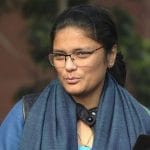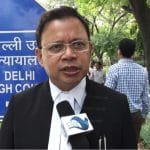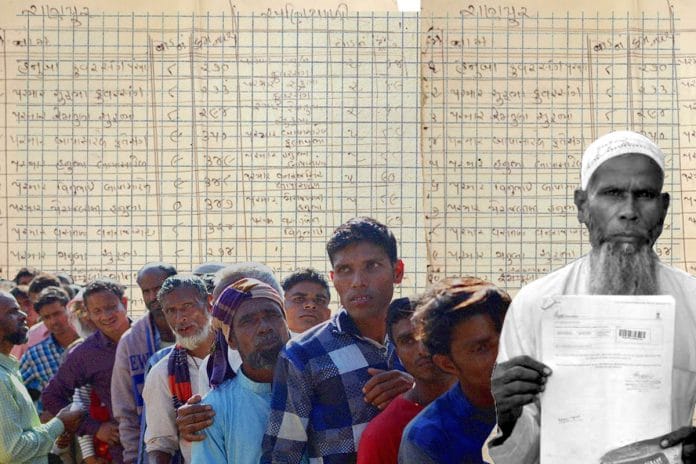The second and final draft of the National Register of Citizens (NRC) in Assam was released Monday. The list left out nearly 40 lakh people.
The NRC draft has created panic within a section of the Assamese community even as the government has assured a process of claims, objections and corrections.
ThePrint asks: Will NRC draft list in Assam send people into an indefinite limbo or do they have legal safeguards?
BJP using citizenship amendment bill as tool to position party as pro-Hindu
 Sushmita Dev
Sushmita Dev
Member of Parliament, Silchar, Assam and president, All India Mahila Congress
There are two issues of import here; first, of the 40 lakh people that have been left out, I am sure there are a lot of genuine citizens. Now, they may have been left out because of human error.
Second, they may have been left out because the NRC has consistently changed the goalpost. Earlier, they said that women who have married and relocated can use a panchayat certificate to prove citizenship. Later, they said it won’t be accepted. When rules get amended so randomly, it is the marginalised who suffer.
The real challenge remains – whether or not these people will be able to access the legal system.
NRC has said they have given time to file claims and objections. Let us say these claims and objections are filed, and reach their logical conclusion. Despite that, say 10 lakh or 20 lakh or even 40 lakh people are left stateless. We don’t know the exact number yet, but there will be a number. I want the national leaders across party lines to address where will these people go? Bangladesh doesn’t accept them as citizens.
The NDA’s solution is a half-baked citizenship amendment bill, which is basically trying to provide shelter on the basis of religion without giving citizenship. However, when a person becomes stateless, it is more a question of basic human rights rather than religion.
State governments can say they don’t want foreigners. But will we push these people across the border?
The BJP is using the Bill as a tool to position the party as pro-Hindu. In the meantime, we have set up free legal clinics to ensure that not a single genuine citizenship is wrongly targeted.
India’s commitment to human rights covenants will make it difficult to deport illegal migrants
 Rajat Sethi
Rajat Sethi
Advisor to Chief Minister of Manipur and author, The Last Battle of Saraighat: The Story of the Rise of BJP in the Northeast
The updation of National Register of Citizens (NRC) in Assam is finally over and its final draft will be published today. An exercise that has been going on for the past four years under the supervision of the Supreme Court is by far the world’s biggest exercise to test and establish citizenship of roughly 4 crore people – and in the process identify foreign illegal migrants.
Identification of illegal migrants and their eventual deportation has been the essence of the Assam Accord signed between Government of India and agitating students of All Assam Students’ Union (AASU) in 1985.
More than three decades later, the nation faces a looming question: what would be the status of those who fail to make it to the NRC register, and are therefore rendered ‘state-less’? Some rough estimates suggest that approximately 20 lakh people won’t qualify as bonafide Indian citizens. Would they be deported, if yes, then how soon and where will they go?
First, both the union ministry of home affairs and the Assam government have made it amply clear that the final list being released will still be a ‘draft’. Claims and objections can be filed and remedial measures will be taken for any mistake.
The final draft, however, will certainly push a major chunk of Assamese residents into chaos. Given India’s commitment to international human rights covenants, it would be difficult to deport them. Moreover, Bangladesh has squarely refused to take any of these migrants back into their country.
During the 2016 Assam state elections, the BJP national and state leadership sought the opinion of Assamese civil societies over several plausible ways to come out of this quagmire. Some of the proposals that emerged were: a simple disenfranchisement of the illegal migrants, or issuing work permit quota for this segment, or offering tenant rights.
Each of these plausibilities needs to be debated at length keeping the human rights question in sight. Neighbouring northeastern states will also be on alert because the panic situation might result in internal displacement and spill over of illegal migrants into adjoining regions.
NRC necessary but insufficient to prevent indigenous population from becoming minority
 Upamanyu Hazarika
Upamanyu Hazarika
Supreme Court lawyer, submitted Hazarika Commission report on illegal Bangladeshi migrants
Assam, unlike the rest of the country, bore the additional burden of illegal migrants for 23 years after Independence by giving them citizenship. In 1985, the Assam accord was signed. It promised to identify and expel illegal migrants after 25 March 1971, while for rest of country it was 19 July 1948.
However, nearly 33 years since it was signed, it is being implemented only now through the National Register of Citizens (NRC) updation. According to then-UPA minister Sriprakash Jaiswal, there were 50 lakh Bangladeshi infiltrators in Assam as of 2001.
In 2016, based on data provided by Kiren Rijiju, their population had grown to over 80 lakh. If they are allowed to expand at this rate, it is the indigenous population which will become a minority. Three independent studies say indigenous people will become a minority by 2040, 2047 or 2051.
Under the NRC, Bangladeshi foreigners who came to Assam after 1971 are being identified. Eight hundred and fifty five people were martyred in a six-year-old agitation that had aimed to send Bangladeshi migrants back to their country. The procedure to identify the illegal migrants evolved after discussion with all, including migrant groups representing foreigners.
However, exclusion from NRC will not ipso facto make them foreigners. A foreigner has to be declared so by a ‘Foreigners Tribunal’.
If 30 lakh are excluded and 100 tribunals will have to hear all the cases, it means every tribunal will have to deal with close to 30,000 cases. That is a gargantuan task and will lengthen the process.
All of India sees this as a Hindu-Muslim issue. But at the end of the day, Assam has a rich ethnic diversity, and it is the indigenous population that has been suffering. By creating a protracted process to declare someone as an illegal immigrant, we are only protecting foreigners. They have a legal shield and because of the long delay an opportunity to become citizens by birth.
NRC is necessary but insufficient to prevent the indigenous population from becoming a minority. The only way to ensure their survival is to give them protective legislation, reserve land and resources only for those who were citizens in 1951 and their progeny.
Bottom line is: This is a draft, let’s wait for the final list
 Aman Wadud
Aman Wadud
Lawyer based out of Guwahati
This is a complete draft, and not the final list. That will be released in the course of time after due process is followed.
NRC has also assured people that no one is going to be deported as of now. There is no cause for fear yet.
NRC is a complex process that hasn’t happened in India ever before. The earlier draft had excluded even more people. Now nearly 40 lakh have been left out of the complete draft. However, after 30 August, the process of claims, objections and corrections will start.
Those excluded can file claims to know why they have been left out of the list. The process will work both ways – inclusion as well as exclusion can be challenged. Any other legal process will only commence after the final list comes out.
There is nothing very worrying happening right now. This is a Supreme Court-monitored process. We need to have faith in the system. We hope the process will be transparent and just. We need to wait for the results to pan out before we accuse anyone of bias or prejudice.
Let us not brand anyone who has been excluded or included just yet. These people aren’t foreigners or stateless.
The bottom line is – this is a draft, let’s wait for the final list.
Those who don’t find mention in list could be treated with degree of suspicion
 Ruhi Tewari
Ruhi Tewari
Associate Editor, ThePrint
With the final NRC draft in Assam leaving out around 12 per cent of the applicants from the list, it is bound to create a degree of uncertainty and anxiety among a section of people.
As has been repeatedly reiterated, this is just the complete draft and not the final list. Therefore, those who haven’t found their names in the list are in no way to be declared non-Indians.
The process of claims and objections will now follow – the duration of which will depend on the number of applications received. After this, the final list will be drawn up. Even after that, aggrieved sections have the option of legal recourse.
But, the issue is far too complex and controversial for it to be only about legal and other safeguards. The indigenous Assamese has for long harboured resentment against ‘outsiders’, irrespective of religion. Now, those who don’t find a mention in the updated list could be treated with a degree of suspicion – especially if they are religious or linguistic minorities, thus further deepening existing social schisms.
Further, there is no clarity or no roadmap for future course of action. What happens to those who don’t find their names even in the final list? What happens to those eventually declared as illegal migrants? Even if they did immigrate after 24 March 1971 – the cut-off date – they are in Assam for close to five decades, and the state is now home to them and their next generations.
Lack of uncertainty does leave them in a sort of tense limbo. It also leaves Assam’s society on an unsure footing because nobody really knows who will eventually be declared a non-citizen and what would then happen to them. This will also create marked divisions between those who have got the NRC stamp and those who’ve so far failed to get it.
Compiled by Deeksha Bhardwaj, journalist at ThePrint.






